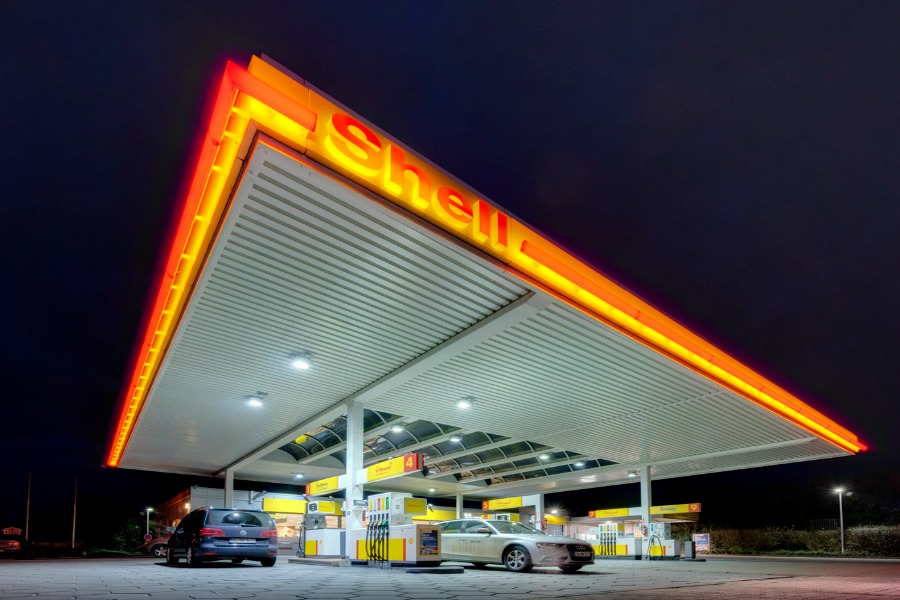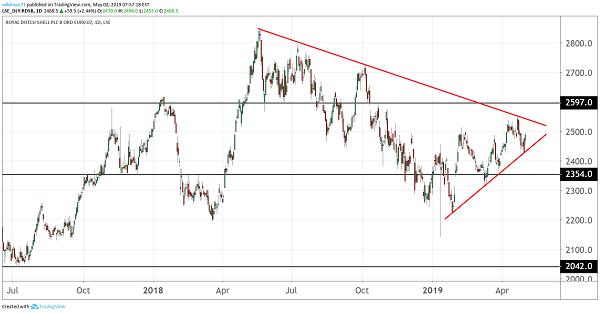Royal Dutch Shell: A world-class investment case?
Prized for its healthy dividend, Shell shares are up nicely on these first-quarter results. Here's why.
2nd May 2019 13:56
by Graeme Evans from interactive investor
Prized for its healthy dividend, Shell shares are up nicely on these first-quarter results. Here's why.

With share buy-backs in full flow and Q1 results comfortably beating expectations across the full range of operations, there's plenty to like about Royal Dutch Shell (LSE:RDSB) at the moment.
The Anglo-Dutch company certainly appears to be firing on all cylinders under CEO Ben van Beurden, with today's results easily outpacing those of London-listed rival BP (LSE:BP.) seen on Tuesday.
Profits were just 2% lower $5.43 billion despite weaker oil prices, a figure much better than the $4.5 billion forecast in the City beforehand. UBS said the energy giant had produced double-digit beats across all operating segments, with the former BG business that is now badged as the Integrated Gas division delivering earnings 24% above consensus amid LNG price strength.
Upstream exploration and production beat consensus by 15%, while downstream earnings came in 16% stronger as good performances in marketing and trading helped to overcome challenging market conditions.
UBS analyst Jon Rigby continues to see a significant upside in Royal Dutch Shell shares, with a price target of 2,900p based on oil prices of around $70 a barrel and an enterprise value to cash flow multiple of 6.3x. RBC Capital Markets is at 2,750p while JP Morgan Cazenove recently upped its target to 2,850p.

Source: TradingView Past performance is not a guide to future performance
The high-yielding shares have so far shown a reluctance to approach these targets, with the uncertain outlook for oil prices one factor in a narrow trading range in the year to date. Today's results provided a welcome boost for the shares, which climbed almost 3% to 2,493p.
There was also the reassurance provided by the promise of another tranche in the group's share buy-back programme, which Shell predicts will reach at least $25 billion by the end of next year. It has bought $6.75 billion since last summer, with another $2.75 billion due by late July.
If Shell wants to meet its pledge of delivering a “world-class investment case”, it will have to show going forward that it is capable of fully funding shareholder returns with free cash flow when oil prices are not so favourable.
The benchmark for achieving this was set at the end of last year when near-record quarterly cash flows of almost $15 billion easily covered its cash dividend, interest payments, share buybacks and helped to further pay down debt.
Dividends distributed to shareholders in the first quarter amounted to $3.9 billion, with the pay-out again set at 47 cents a share for a forward yield of just over 6%. The dividends are now entirely in cash, with the company no longer offering a share-based alternative.
Since 2016, Shell has completed more than $30 billion of divestments to reduce borrowings from the BG acquisition while stepping up investment in projects offering improved cash generation.
Mr van Beurden said the results showed the strength of the company's strategy and quality of its assets. He added:
"The consistent performance across all our businesses provides confidence in meeting our 2020 outlook."
These articles are provided for information purposes only. Occasionally, an opinion about whether to buy or sell a specific investment may be provided by third parties. The content is not intended to be a personal recommendation to buy or sell any financial instrument or product, or to adopt any investment strategy as it is not provided based on an assessment of your investing knowledge and experience, your financial situation or your investment objectives. The value of your investments, and the income derived from them, may go down as well as up. You may not get back all the money that you invest. The investments referred to in this article may not be suitable for all investors, and if in doubt, an investor should seek advice from a qualified investment adviser.
Full performance can be found on the company or index summary page on the interactive investor website. Simply click on the company's or index name highlighted in the article.